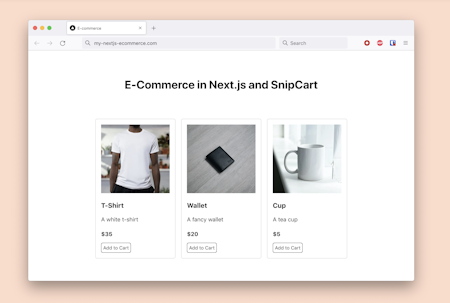The eCommerce market has evolved at an incredible pace, and we are all now used to buying products online. Customer needs have changed accordingly, and users now expect and seek omnichannel experiences. This is something that traditional eCommerce solutions cannot offer. This is why you should consider embracing a headless eCommerce CMS, which allows you to manage your content while building your store with a headless eCommerce frontend library.
First, let’s learn what an eCommerce CMS is, what makes an eCommerce CMS, and why a headless eCommerce CMS is the solution you are looking for.
What is an eCommerce CMS?
An eCommerce is an online shop that allows users to purchase products or services through your website. You can think of it as a digital representation of a physical store. An eCommerce CMS is a content management system that enables you to manage, organize, and distribute content across your eCommerce platforms. Put it another way, an eCommerce CMS is a piece of software that provides ecommerce store owners with everything they need to run a digital marketplace from a content management perspective.
An eCommerce CMS should support digital store owners, regardless of their technical skills.
Simply put, an eCommerce CMS must give ecommerce owners the ability to insert, edit, or delete products, manage their images, videos, and general information, and define discounts and promotions. All through an interface that is within everyone's reach.
In other words, an eCommerce CMS is a user-friendly structure that handles all the backend store management functions needed to run an online store. Therefore, an eCommerce CMS can be thought of as a term to describe a complete, easy-to-use, online-selling-ready CMS.
Let’s now delve into what makes a CMS an eCommerce CMS.
What Characteristics Should an eCommerce CMS Have?
We could mention several characteristics, but there are four main features that every eCommerce CMS should have. Let’s take a look at them.
1. Optimized for SEO
SEO (Search Engine Optimization) is one of the most important aspects to drive traffic to your website and build brand awareness. Therefore, considering that there are thousands of eCommerce stores you have to compete with, an eCommerce CMS must provide you with SEO optimization capabilities. You should not be a SEO expert to run an eCommerce store. Instead, your eCommerce CMS should implement eCommerce SEO best practices and offer optimization when it comes to page content, meta descriptions, and page titles.
2. Designed to support your marketing campaigns and sales strategy
Selling is about defining the right strategy and devising successful marketing campaigns. For this reason, an eCommerce CMS should offer built-in marketing and sales features to support your sales strategy. For example, running a blog directly connected to your eCommerce store is a key aspect to attracting new customers and growing brand awareness. Also, offering your customer omnichannel journeys will increase your conversion rates.
Learn more about how an omnichannel strategy works and how to implement an Omnichannel CMS.
3. Built to achieve high-quality UX and UI designs
Successful eCommerce platforms are easy to use. Users must enjoy the time spent browsing and shopping in your digital stores. However, building high-quality UX and UI is not easy.
Consequently, the ideal eCommerce CMS should focus only on content management and give frontend experts and designers full freedom to design and implement the best possible UX (User Experience) and UI (User Interface).
As you are about to learn, this is possible only with a headless eCommerce CMS.
4. Developed around testing, reporting, and analytics
Your eCommerce CMS should allow you to retrieve and explore data and analytics. That way, you can support your marketing and sales strategy with data-driven decisions. Such an approach can really help grow your brand. So, a great eCommerce CMS should be easy to integrate with data analytics platforms. Also, it should support A/B testing.
Why a Headless eCommerce CMS is Better?
A headless CMS is a backend-only content management system that allows you to handle, update, and store content in one place. A headless CMS acts as a single source of content, which can be accessed via APIs. This makes a headless CMS a fully-decoupled platform, you can integrate with any frontend technology or libraries.
In recent years, the headless paradigm has gained popularity and has become one of the most important IT trends. Headless is now considered a powerful, modern, future-proof approach to gaining speed, flexibility, and scalability. In particular, the headless paradigm has also been widely adopted in the eCommerce world.
Traditional eCommerce solutions involve one system to manage the entire sales flow, from data management to data presentation. This monolithic architecture couples the presentation layer with the eCommerce logic and flow, resulting in a limited platform in terms of flexibility. This is particularly restricting if you want to offer an omnichannel experience to your customers.
As a result, headless eCommerce solutions have become increasingly popular and now represent the preferred way to build an online digital store.
Let’s now delve into the relationship between headless CMS and headless eCommerce solutions.

A Headless eCommerce Requires a Headless CMS
A headless eCommerce is a solution in which the storefront and the eCommerce data management are decoupled. The two elements are independent and communicate through an API level. Generally, the headless eCommerce solution provides you with the frontend functionality any eCommerce platform should have, while using APIs to retrieve the content they need.
As you can imagine, the ideal scenario is integrating a headless eCommerce fronted library with your headless CMS via API. This way, you can have the best of both worlds. You can manage your product content with a platform designed for it, such as a headless eCommerce CMS, and use the most advanced front-end technologies to build your digital store. In fact, headless solutions allow you to integrate the best-of-breed solutions on the market and achieve a composable architecture.
Read this article to learn more about what composable architecture is.
In addition, your customers expect to be engaged and able to access your eCommerce platform across multiple channels and devices. As you can imagine, this is possible only by taking a headless approach. So, if you want to build a future-proof eCommerce platform, you need a headless eCommerce CMS.
DatoCMS: The Headless eCommerce CMS of the Future
DatoCMS is a headless CMS that comes with all the aforementioned characteristics any headless eCommerce CMS should have, and several others. This makes DatoCMS an advanced headless eCommerce CMS that can be easily used to build an ecommerce platform, as shown in the following articles:
Creating a Static eCommerce Website with Snipcart, GatsbyJS, and DatoCMS
How To Build an eCommerce Application in React With Snipcart
Also, you can get your eCommerce website right away in a matter of minutes thanks to our demo projects:

Try also our Gatsby ecommerce template, or React ecommerce template.
Conclusion
In this article, you learned what an eCommerce CMS is, what features are essential in a CMS, and why a headless eCommerce CMS is inherently the best solution when used together with a headless eCommerce solution.
The eCommerce world is evolving and traditional solutions no longer meet what users expect from online stores. Specifically, you can no longer couple your content management process with your storefront logic, as traditional eCommerce would. A headless approach to both eCommerce and content management is required, and you should consider adopting a headless eCommerce CMS, just like DatoCMS.
Thanks for reading! We hope that you found this article helpful. Feel free to reach out to us on Twitter with any questions, comments, or suggestions.
